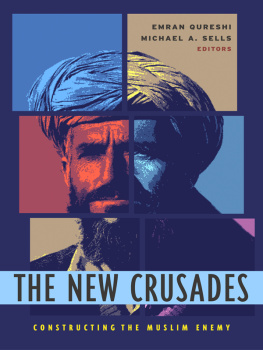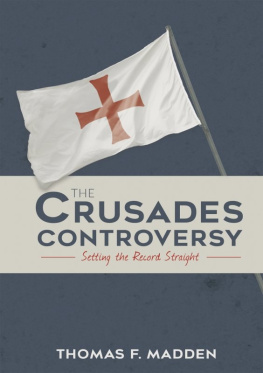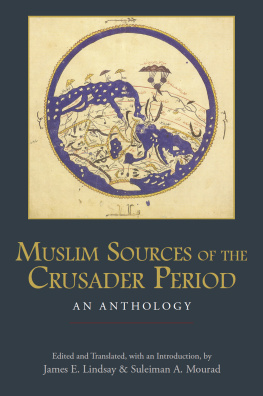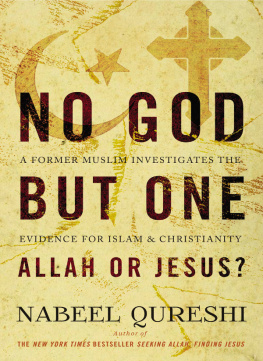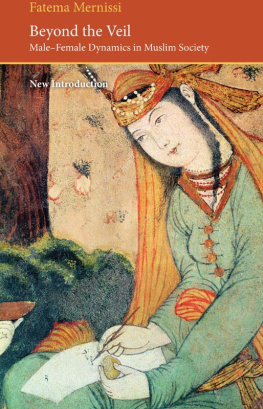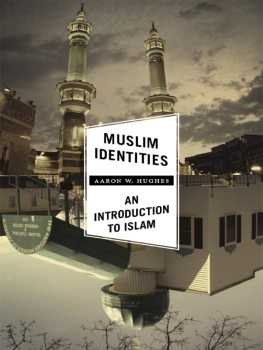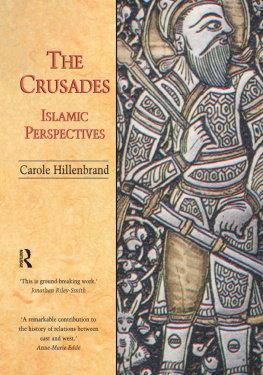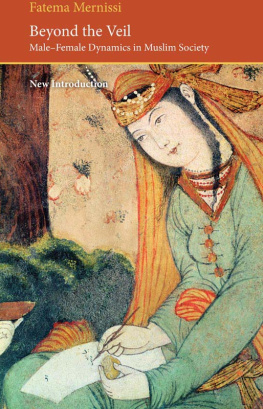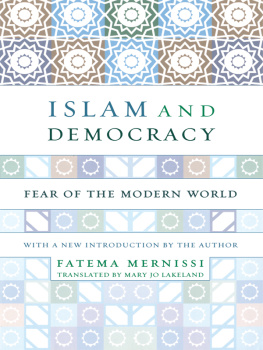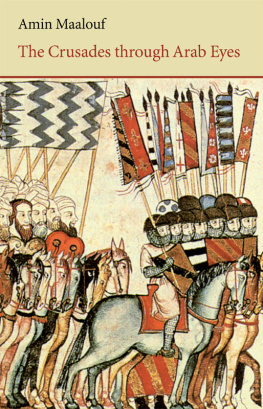The New Crusades
The New Crusades
Constructing the Muslim Enemy
Edited by Emran Qureshi
and Michael A. Sells
C O L U M B I A U N I V E R S I T Y P R E S S N E W Y O R K

COLUMBIA UNIVERSITY PRESS
Publishers Since 1893
New York, Chichester, West Sussex
cup.columbia.edu
Copyright 2003 Columbia University Press
All rights reserved
E-ISBN 978-0-231-50156-9
Library of Congress Cataloging-in-Publication Data
The new crusades : constructing the Muslim enemy / edited by Emran Qureshi and
Michael A. Sells.
p. cm.
Includes bibliographical references and index.
ISBN 0231126662 (cloth : alk. paper)ISBN 0231126670 (pbk. : alk. paper)
1. Islamic countriesForeign relationsEurope. 2. EuropeForeign relationsIslamic countries. 3. Islamic fundamentalism. 4. WarReligious aspectsIslam. 5. Islamic countriesForeign relationsUnited States. 6. United StatesForeign relationsIslamic countries. 7. TerrorismReligious aspectsIslam.
I. Qureshi, Emran. II. Sells, Michael Anthony.
D860.N389 2003
327.401767109045dc21
2003043768
A Columbia University Press E-book.
CUP would be pleased to hear about your reading experience with this e-book at .
In Memory of Eqbal Ahmad
Contents
This book is dedicated to the living memory of Eqbal Ahmad (19331999). Eqbal Ahmad nurtured this book project: guiding it, encouraging it, and contributing to it immeasurably over a five-year period. It is only fitting that his contribution be suitably acknowledged. This preface is thus intended to be a tribute to Eqbal Ahmad, a brief tribute, but one that nevertheless attempts to outline his contributions to this book project and, more important, to briefly sketch the contours of his political thought.
Eqbal Ahmad was among the most original political thinkers on the Middle East and South Asia. Eqbal Ahmads writings consist of weekly commentaries on third world societies. Regrettably, he is known primarily as a journalist. Many of his political ideas are submerged within his journalistic writings. Within these weekly commentaries he wrote extensively on the pathologies of state and society in the Arab-Islamic world. Woven through these commentaries is a coherent set of political beliefs about third world societies and the ills that afflict them. Together, these commentaries draw a powerful, penetrating portrait of third world societies in a near permanent state of crisis.
At first blush, it is difficult to categorize the political ideas of Eqbal Ahmad. His work is evocative of the theories of Hannah Arendt and Antonio Gramsci. Like Hannah Arendt, Eqbal Ahmad examined the crucial political events of the day and, like Gramsci, he was an organically connected intellectual. He defined his politics in an interview as socialist and democratic and by democratic I mean [a] genuine commitment to equality, freedom of association, to critical thought and to accountability of rulers to citizens and noted I took rather seriously Karl Marxs old dictum that the function of knowledge is to comprehend in order to change. Eqbal Ahmad in his essays examined imperialism, revolutionary transformation, and the rise of Islamic fundamentalism, third world democracies, and the pathologies of postcolonial societies. His writings were original and subtle, complex, and interconnected, always providing clarity and insight into the pathologies afflicting third world societies, especially his native Pakistan.
Hannah Arendt once observed, No matter how abstract our theories may appear, there are incidents and stories behind them which, at least for ourselves, contain as in a nutshell the full meaning of whatever we have to say. The basic questions that animated Eqbal Ahmads political thought sprang from his particular life experiences: the tumult and the horrors of the bloody partition of the Indian subcontinent, the struggle for Algerian independence, support for the Palestinian cause, the fight against Pakistani military dictators, and the bitter harvest of postcolonial states and societies.
It is not Eqbal Ahmads genuinely unique insight into Arab-Islamic societies that is the primary reason for the increasing interest in his work but his steadfast independence as a public intellectual, which would not be compromised or intimidated. This anthology is, accordingly, conceived in that spirit. It is intended to critique a longstanding, dominant Western intellectual tradition that views Islam as an existential threat and to explore the consequences of viewing a religion and a culture as a threat.
Notes
. Eqbal Ahmad, Confronting Empire (Cambridge: South End, 2000), p. 66.
. Margaret Canovan, Hannah Arendt: A Reinterpretation of Her Political Thought (Cambridge: Cambridge University Press, 1992), p. 1.
. See Carollee Bengelsdorf and Margaret Cerullo, eds., The Collected Writings of Eqbal Ahmad (New York: Columbia University Press, forthcoming).
. Eqbal Ahmad, Confronting Empire (Cambridge: South End, 2000), p. 66.
For their help and support, we wish to thank Amina Adams, Amila Buturovic, David Barsamian, Annette Barone, Zahida and Akram Bhatti, Kim Elliott, Diane Fruchtman, Ayman Hassan, F. Zahra Hassan, Alia and Murray Hogben, Humera Ibrahim, Afra Jalabi, Mariam Jalabi, Alim Khan, Faiz Khan, Jabbar Khan, Rahat Kurdi, Zaineb Istrabadi, Laurie Hart, Janet Marcus, Tarek Mounib, Adnan Qayyum, Alireza Rahbar-Shamskar, Bruce Shapiro, Jeff Spurr, and Jamel Velji.
The Hogben residence in Kingston, Ontario has long been a literary salon for those keen on passionately debating and struggling for womens rights in the Islamic world over camaraderie, good cheer, and Tim Hortons coffee. Rafi Khan, Soraya Moghadam, Nelofer Pazira, and Andaleeb Qayyum have provided encouragement over many years.
The idea for this book was first discussed with the late Eqbal Ahmad, who constantly and tirelessly encouraged the project at every opportunity. It was conceived in a long series of conversations with Rabia Ali and Lawrence Lifschultz, who presciently noted that any investigation of anti-Muslim prejudice must also deal with the pathologies of Muslim societies.
Khaled Abou El Fadl, Ammiel Alcalay, Abdullah An-Naim, Juan Cole, Susan Dayall, David Theo Goldberg, John Lotherington, John P. McCormick, Norma Claire Moruzzi, Carol Off, and Danny Postel generously answered numerous queries.
We wish to thank Roger Owen and Thomas Mullins of Harvard Universitys Center for Middle Eastern Studies for allowing unfettered access to the center and its affiliated libraries. As well, Andrs Riedlmayer of the Harvard Fine Arts Library patiently, expertly, and graciously answered far too many questions.
Haverford College has supplied generous research assistance.
The editors and staff at Columbia University Press have supervised the design and production of this volume with care, insight, and patience. We owe special gratitude to Susan Pensak for her superb copyediting and responsiveness throughout the editing process.
Emran Qureshi wishes especially to thank Nader Hashemi and Ausma Khan for support above and beyond the call of friendship and offers gratitude to Zamir and Iqbal Qureshi for exemplifying a tolerant and plural view of humanity.
We wish to express our deepest appreciation to the contributors of this anthology for their tireless efforts and forbearance in bringing this project to publication.
The Clash of Civilizations
Is Islam at war with the West? A number of voices, from Harvard political scientist Samuel P. Huntington to the exiled Saudi radical Osama bin Laden have answered yes. The ruthless and deadly attack of September 11 has led to a new wave of enthusiasm in the U.S. for Huntingtons claim that there is a clash of civilizations between Islam and the West and that Islamic civilization is, by its very nature, hostile to Western values. There is no doubt the suicide bombers hated the civilization symbolized by their targets: the World Trade Center in New York, the Pentagon, and, most probably, the Capitol or White House. The attitudes and pathologies they exhibited certainly represent a serious threat.
Next page
